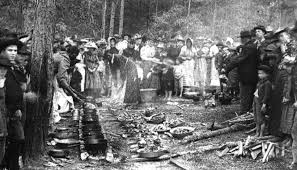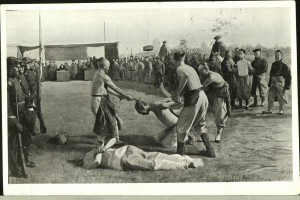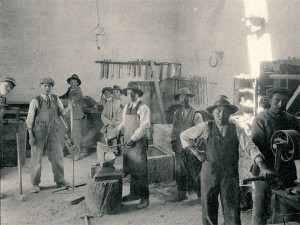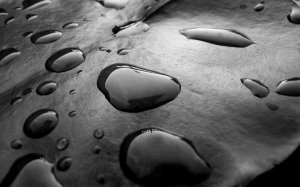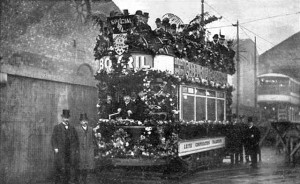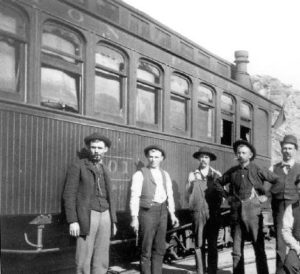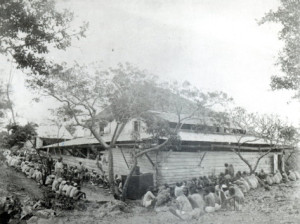Tag Archives: 1891
Lo Stato e il suo ruolo storico
Pëtr Kropotkin (1891)
Breve nota introduttiva
Nato come conferenza di propaganda, questo libretto viene, nella seconda edizione italiana, restituito alla sua originaria agilità.
Per molti aspetti teorici il testo tiene presente e riassume l’ampia trattazione sviluppata ne Il mutuo appoggio, ma lo scopo qui è diverso, tende a dimostrare l’insana follia dello Stato, il suo progetto mortale con cui avvinghia e stritola qualsiasi iniziativa di base, qualsiasi organizzazione che non lo affronta risolutamente e tiene lontane le sue proposte di perfezionamento razionalizzante.
La mia Introduzione, (pp. 5-23 alla prima edizione del 1981) non è qui inserita, per non appesantire la fruizione diretta dell’opuscolo. La pubblicherò nella raccolta dei miei scritti dedicati a Kropotkin, in corso di approntamento.
Buona lettura.
Trieste, 15 dicembre 2008
La historia de los panaderos anarquistas en Perú
Nuestros antepasados precolombinos llamaban al pan tanta, también sanco o shanku cuando lo utilizaban ceremonialmente. Los preparaban moliendo el maíz en batán y cocinando la pasta directamente sobre las piedras calientes del hogar, en el rescoldo o en ollas de barro, con y sin agua. Dependiendo del lugar del Tawantinsuyo, habían modificaciones en cuanto a la manera de procesarlo.
Continue reading La historia de los panaderos anarquistas en Perú
You only have the courage to be destructive

Max Stirner (1891)
How happy I was as a child to lie on green fields and look up into blue skies. The sweet smells of Spring would waft through the air as dreamed of my bright future. I dreamed of becoming a great man. I would throw fistfuls of gold out of my carriage and masses of poor and stunned people would worship me. I would build fairy palaces and alhambras. Rosy girls would attend to my every need in flowering gardens. Had I been able to throw myself directly into the work force I should have indeed become a rich and famous man. But alas, I would have only have had the possibility of becoming it, and was therefore not a great man. — Afterall who does not feel great Hope fill his breast? Whose heart does not ache with sweet impatience when he reads page after page about the great things the German people could do and about how everything could potentially become? Yes, we are referred to the following quote: “Hegemony: the German nature carries the stamp of intellectual supremacy and is uniquely blessed with an abundance of talent. Yet how is it that in such a union there is no nation? We are politically and militarily, philosophically and scientifically, poetically and artistically, musically and linguistically, industrially and nautically, and technically gifted. We are so rich in our talents that we outdo other peoples in uniting the individuals pieces of society. Germany identifies as belonging to the constitutional monarchy of the great polity of Europe” (pg. 169). Alas, one must be incapable of desiring blossoming hopes and one must cash in all sweet enthusiasm for homeland and humanity, if one did not want to longingly demand, contemptuously despise, joyously expect, and youthfully dream with the author. And I demanded, despised, expected and dreamed with him. I nourished my love on his enthusiasm and strengthened my beliefs on his hopes. I have lived in rich abundance — Then why am I still discontented, discontented with this book?
Continue reading You only have the courage to be destructive
The Anarchist Defense of Louis Léveillé
Louis Léveillé
The Anarchist Defense of Louis Léveillé
in “L’Anarchie en cour d’assises” by Sébastien Faure, 1891
[On May 1, 1891, after a Labor Day demonstration, police attacked protestors in Clichy. A violent battle ensued and gunfire was exchanged. Three anarchists were arrested. Henri Louis Decamps was sentenced to five years in prison, Charles Auguste Dardare to three and Louis Léveillé (who was wounded in the fight) was acquitted. Ravachol would later take revenge for the injustice in March the following year.]
Continue reading The Anarchist Defense of Louis Léveillé
L’idolatria
Paolo Schicchi
You only have the courage to be destructive
Max Stirner
How happy I was as a child to lie on green fields and look up into blue skies. The sweet smells of Spring would waft through the air as dreamed of my bright future. I dreamed of becoming a great man. I would throw fistfuls of gold out of my carriage and masses of poor and stunned people would worship me. I would build fairy palaces and alhambras. Rosy girls would attend to my every need in flowering gardens. Had I been able to throw myself directly into the work force I should have indeed become a rich and famous man. But alas, I would have only have had the possibility of becoming it, and was therefore not a great man. — Afterall who does not feel great Hope fill his breast? Whose heart does not ache with sweet impatience when he reads page after page about the great things the German people could do and about how everything could potentially become? Yes, we are referred to the following quote: “Hegemony: the German nature carries the stamp of intellectual supremacy and is uniquely blessed with an abundance of talent.
Continue reading You only have the courage to be destructive
You only have the courage to be destructive
Max Stirner (1891)
How happy I was as a child to lie on green fields and look up into blue skies. The sweet smells of Spring would waft through the air as dreamed of my bright future. I dreamed of becoming a great man.
Continue reading You only have the courage to be destructive
Le Personalità
Paolo Schicchi
Abolizione della proprietà
C’era una volta un re, e una regina dalla cui bocca ogni parola che usciva era una cosa dolce.
